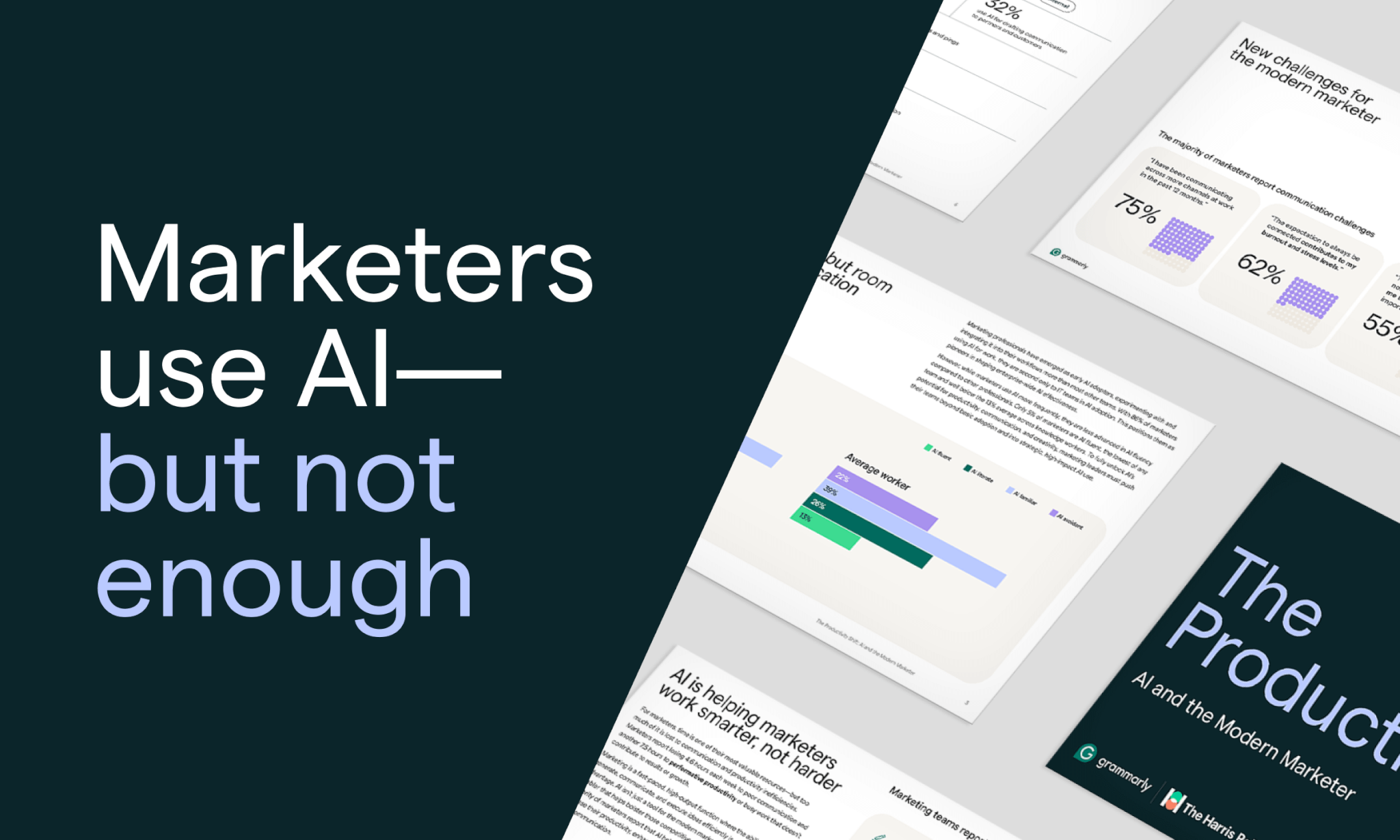AI is changing the way we work—and marketing teams are right at the center of that shift.
From crafting campaign messaging to drafting customer emails, marketers spend more time than any other function communicating, creating content, and collaborating across teams. In fact, the average marketer now spends nearly 42 hours each week communicating across channels.
As marketing workloads grow and the pace of work accelerates, AI has emerged as a powerful tool to help teams stay efficient, aligned, and on-brand. Marketers have been early adopters of AI, especially for writing and content creation. But are they really using it to its full potential?
Marketers are using AI—but not to its full potential
According to our latest report, The Productivity Shift: AI and the Modern Marketer, 86% of marketers say they use AI at work, making them second only to IT professionals in adoption. However, only 5% identify as “AI fluent”—the lowest of any team surveyed. This means that while marketers are eager to experiment with AI, most are still scratching the surface when it comes to using it in more advanced, high-impact ways.
Many marketers use AI to generate short-form content like emails or social posts. But far fewer are tapping into AI’s full capabilities to streamline communication, reduce busywork, or improve brand consistency—areas that offer untapped productivity gains.
The stakes are high. Marketing teams report losing an average of 4.6 hours each week to poor communication and another 7.5 hours to performative productivity—busywork that may look impressive but doesn’t move the needle on outcomes.
And yet, the majority of marketers say AI is already making a difference. In the report, 91% say AI helps them be more productive, 91% say it boosts creativity, and 87% say it improves communication. But to drive even more meaningful change, marketers need to think bigger about how—and where—they use AI.
Three areas to leverage AI to drive better marketing outcomes
There are three key areas where marketers can strategically use AI to work smarter and deliver stronger results:
1. Collaborative communication
AI can support marketers across the entire communication process—from drafting internal updates to responding to stakeholder emails to refining tone for external audiences. While 87% of marketers say AI improves their communication, only a fraction use it for key communication tasks like drafting emails or responding to messages. This is a missed opportunity to reduce time spent on manual writing and improve alignment across teams.
2. Content production
Marketers have embraced AI for writing, with 88% saying they use it to generate content. But they’re not yet applying AI consistently across the full content lifecycle. Just 44% use it for idea generation and only 38% for editing and refinement. That’s a huge missed opportunity, especially for long-form content like blogs, white papers, and internal documents that require more time and strategic thinking. AI can help speed up every stage of content production—without sacrificing quality.
3. Brand consistency
When brand credibility is on the line, consistency matters. And that’s where AI’s impact can shine. AI tools like Grammarly can ensure every message—whether it’s a campaign asset or a quick email—follows brand tone and voice, reducing errors and helping teams move faster with confidence.
The bottom line: Strategic AI adoption equals marketing impact
AI isn’t just another productivity tool—it’s a strategic asset that can help marketers keep up with growing demands, reduce inefficiencies, and focus on the work that matters most.
If your team is already using AI to write, that’s a great start. But to stay competitive, you’ll need to go further. Whether it’s improving collaboration, scaling content production, or maintaining brand integrity, AI can help you do it better—and faster.Download the full report, The Productivity Shift: AI and the Modern Marketer, to dive deeper into how marketing teams are using AI today, where they’re falling short, and how to unlock AI’s full potential.



